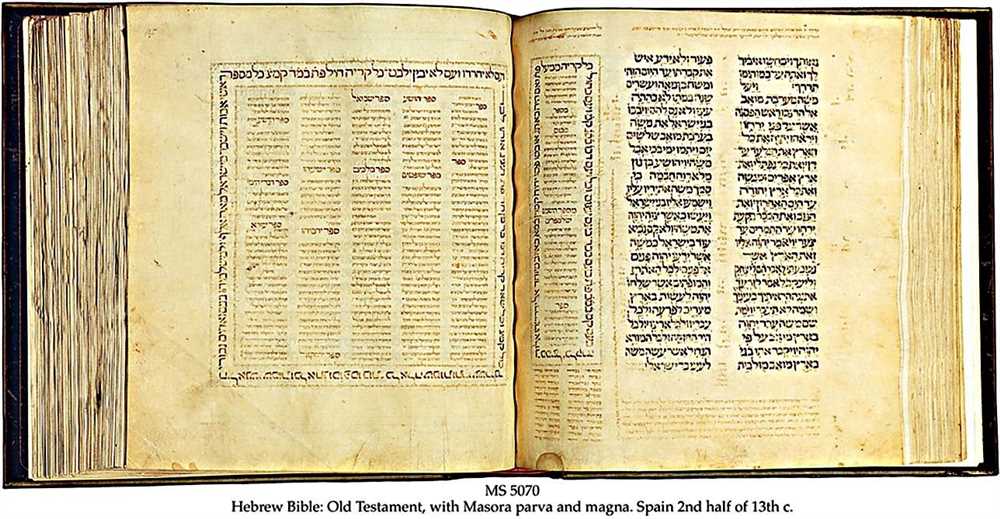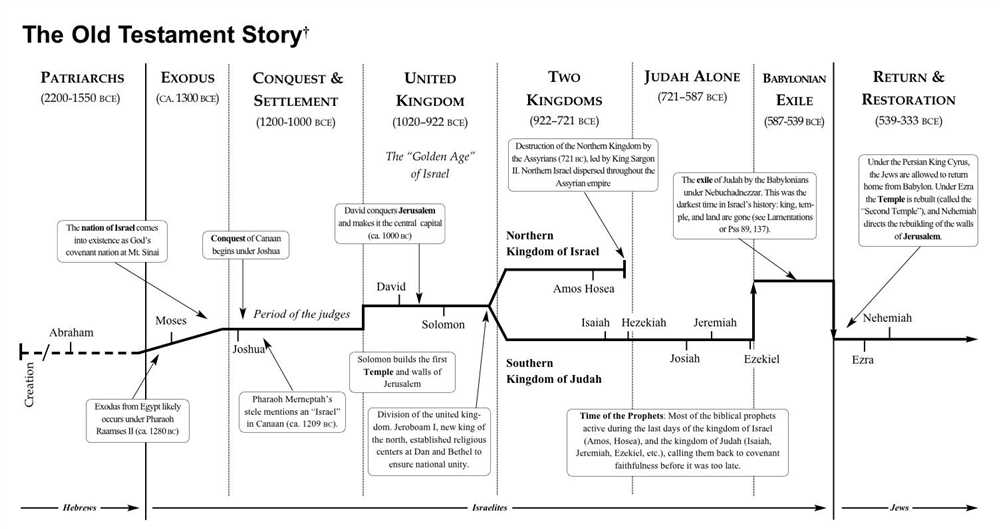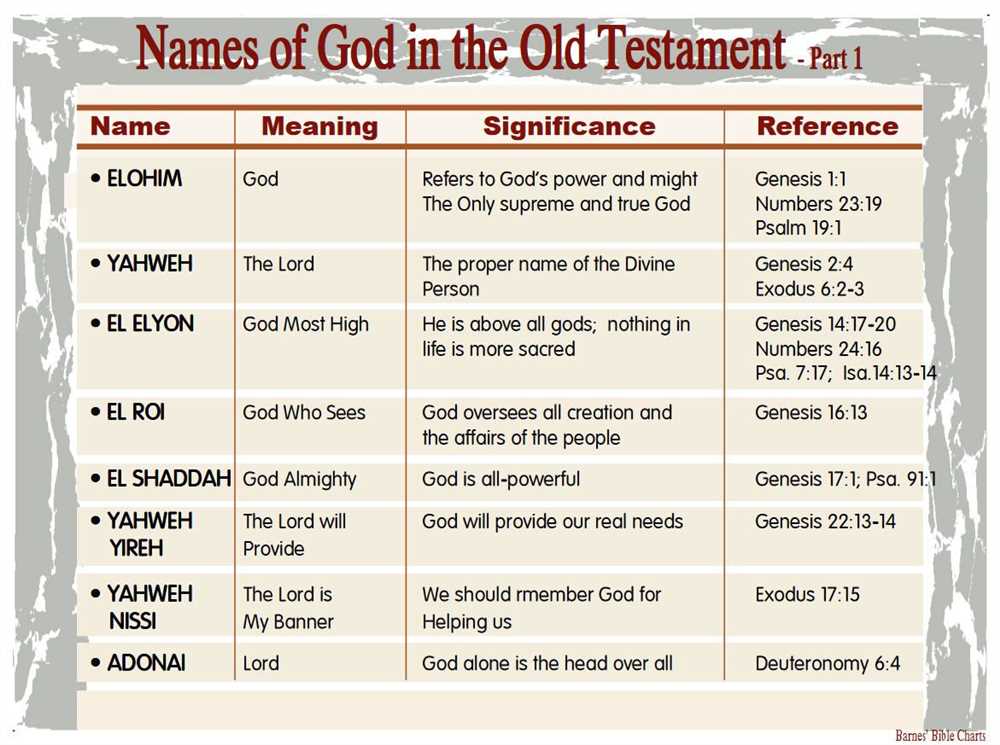
The Old Testament is a significant religious text that holds immense value and wisdom for millions of people around the world. Composed of various books and scriptures, it serves as a foundation for understanding the beliefs, history, and traditions of Judaism and Christianity. However, for many individuals, navigating the Old Testament can be a daunting task due to its complex narratives, theological concepts, and cultural contexts.
In this article, we aim to make the Old Testament more accessible and comprehensible for those seeking an introductory understanding. By breaking down key themes, explaining historical events, and delving into the lives of prominent biblical figures, we hope to shed light on the significance and relevance of this ancient text in our modern world.
Whether you come from a religious background or are simply curious about one of the world’s oldest texts, “Old Testament Made Easy” provides a clear and concise overview for beginners. By focusing on the main messages and teachings of each book, we aim to demystify the seemingly complex plots and narratives, allowing you to engage with the Old Testament on a deeper and more meaningful level.
Understanding the Old Testament: A Comprehensive Guide

The Old Testament is a fundamental religious text that contains the sacred writings of Judaism and forms the first part of the Christian Bible. However, for many readers, it can be a daunting and challenging book to understand. That is why a comprehensive guide to the Old Testament is essential to help unravel its complexity and reveal its rich teachings.
Key Themes in the Old Testament:
The Old Testament covers a vast range of themes that are essential to understanding its overall message. One prominent theme is the concept of covenant, which is the binding agreement between God and his people. Through various covenants, God promises to bless, protect, and guide his chosen people, while they commit to following his commandments and remaining faithful. Understanding the significance of these covenants provides a crucial framework for interpreting the Old Testament.
Exploring the Stories and Prophets:
Another essential aspect of the Old Testament is the collection of stories and prophetic writings. Familiarizing oneself with these narratives helps to understand the historical context in which they were written and the moral and spiritual lessons they convey. From the creation of the world to the exile and return of the Israelites, these stories provide crucial insights into the faith and struggles of the ancient Hebrew people.
The Role of Law and Worship:
The Old Testament also lays out a comprehensive legal code, known as the Mosaic law, which governs the moral, social, and religious life of the Israelites. Understanding the purpose and significance of these laws helps to decipher the intricate system of daily life and religious practices of the ancient Israelites, providing valuable insights into their culture and beliefs.
Interpreting Prophecies and Messianic Expectations:
Throughout the Old Testament, there are numerous prophecies and predictions about future events and the coming of a Messiah. Unraveling these prophecies can be challenging, but understanding their context and examining the messianic expectations of the ancient Hebrews illuminates the historical and religious significance of these prophecies.
A Comprehensive Guide to Enhance Understanding:
In an effort to make the Old Testament more accessible, various comprehensive guides have been created to break down its complex themes, explore the historical and cultural context, and provide valuable commentary and analysis. These guides aim to assist readers in navigating through the Old Testament, providing clarity and insight into its profound teachings and messages.
For further resources and recommendations on understanding the Old Testament, please check out the following:
- Bible commentaries and study guides
- Historical and cultural background books
- Academic courses and lectures
- Online resources and forums
Discover the timeless wisdom contained in the Old Testament and its relevance today

The Old Testament, also known as the Hebrew Bible, is a rich collection of ancient writings that holds immense significance for many people across different religious and cultural backgrounds. It is a fundamental text that has shaped not only Judaism but also Christianity and has left an indelible mark on human civilization as a whole. The Old Testament is a treasure trove of wisdom, offering valuable insights into human nature, morality, spirituality, and the relationship between humanity and the divine.
One of the remarkable aspects of the Old Testament is its enduring relevance in today’s world. Although it was written thousands of years ago, its teachings still provide guidance and understanding for contemporary issues and challenges. The stories, parables, and teachings contained in the Old Testament address timeless themes, such as justice, compassion, faith, and the pursuit of righteousness. They offer valuable lessons that can be applied to our modern lives, helping us navigate the complexities of the world we live in and make ethical and moral choices.
The Old Testament provides a deep understanding of our shared human experience, illuminating the complexities of our emotions, relationships, and struggles. It showcases the triumphs and failures of humanity, revealing the consequences of our actions and highlighting the importance of virtues such as humility, forgiveness, and love. The Old Testament offers profound insights into the human condition and provides a roadmap for personal growth, relationships, and spiritual development.
Furthermore, the Old Testament serves as a historical and cultural roadmap, connecting us to our roots and providing a sense of identity and belonging. Its stories and traditions carry the wisdom and traditions of ancient civilizations, reflecting the history and customs of the Jewish people. Understanding the Old Testament allows us to appreciate our collective heritage and fosters dialogue and understanding between different cultures and faiths.
- By exploring the Old Testament, we can gain a deeper understanding of the foundations of Western civilization, including its legal, moral, and ethical principles.
- It offers valuable insights into the nature of God and the divine-human relationship, helping individuals on their spiritual journeys and fostering a sense of connection and purpose.
- The Old Testament also presents prophetic visions and promises of hope, inspiring individuals to work towards a more just and compassionate world.
- By studying the Old Testament, we can engage in critical thinking and reflection, contemplating the meaning and purpose of life and grappling with existential questions.
In conclusion, the Old Testament serves as a timeless source of wisdom, offering valuable teachings, insights, and guidance for individuals seeking a deeper understanding of themselves, their spirituality, and their relationship with the world. It holds relevance for people of different backgrounds, cultures, and faiths, providing a universal framework for moral and ethical living and fostering dialogue and understanding among diverse communities.
Exploring the Historical Context of the Old Testament

The Old Testament, also known as the Hebrew Bible, is a sacred text for Judaism and an important religious scripture for Christianity. It is a rich collection of stories, laws, and teachings that provide insight into the history and beliefs of the ancient Israelites. To fully understand the Old Testament, it is essential to explore its historical context and the events that shaped its formation.
The Old Testament covers a vast period of time, from the creation of the world to the rebuilding of Jerusalem after the Babylonian exile. It reflects the historical experiences, cultural practices, and religious beliefs of the Israelite people. Understanding the historical context involves examining the political, social, and cultural factors that influenced the writings found within the Old Testament.
One key aspect of the historical context is the Ancient Near Eastern world in which the Israelites lived. The Israelites were a small group of people surrounded by powerful empires such as Egypt, Assyria, and Babylon. These empires exerted significant influence over the region and shaped the geopolitical landscape. The Old Testament narratives often reflect the interactions between the Israelites and these neighboring nations, including conflicts, alliances, and cultural exchanges.
Another important aspect of the historical context is the religious practices of the ancient Israelites. The Israelites were monotheistic, worshiping one God, Yahweh. This was a distinctive belief in a polytheistic world. The Old Testament records the Israelites’ encounters with other religions and their struggles to maintain their monotheistic faith in the midst of competing beliefs. It also contains numerous laws, rituals, and moral teachings that guided the religious and ethical practices of the Israelite community.
By exploring the historical context of the Old Testament, we can gain a deeper appreciation for its significance and relevance. It allows us to understand how the ancient Israelites grappled with the challenges of their time and how their beliefs and practices shaped their identity as a people. It also provides valuable insights into the development of monotheism and the cultural heritage of Judaism and Christianity.
Uncover the historical events and cultural background that shaped the Old Testament

Exploring the Old Testament is a journey into the ancient world, uncovering the historical events and cultural background that shaped this sacred text. The Old Testament, also known as the Hebrew Bible, is a collection of religious writings that hold immense significance for the Jewish and Christian faiths. It is a rich tapestry of stories, poetry, laws, prophecies, and wisdom literature that spans thousands of years. Understanding the historical context in which these texts were written can greatly enhance our appreciation and interpretation of them.
The Old Testament encompasses a vast range of historical events, starting from the creation of the world, the lives of patriarchs like Abraham, Isaac, and Jacob, to the exodus of the Israelites from Egypt and their journey to the Promised Land. It also recounts the establishment of ancient Israel as a nation under kings like Saul, David, and Solomon, as well as the periods of exile, restoration, and the rise of empires such as Babylon and Persia.
The cultural background of the Old Testament is deeply rooted in the ancient Near East, where the Israelites resided. The customs, traditions, beliefs, and social structures of the surrounding civilizations, such as the Mesopotamians, Egyptians, Canaanites, and Assyrians, had a profound influence on the development of Israelite society. By examining the fascinating archaeological discoveries and writings from these civilizations, we can gain insights into the cultural milieu in which the Old Testament was written.
Furthermore, understanding the literary genres and literary devices employed in the Old Testament is crucial for its interpretation. The Old Testament contains various genres, including myth, history, law, poetry, prophecy, and wisdom literature. Each genre has its own unique characteristics and purposes, which must be taken into account when delving into the meaning of the text.
In conclusion, delving into the historical events and cultural background that shaped the Old Testament is essential for a comprehensive understanding of this sacred text. By unraveling the ancient world in which it was created and examining its literary features, we can grasp the profound messages and teachings that the Old Testament holds for believers and scholars alike.
Unlocking the Key Themes of the Old Testament
The Old Testament is a rich and complex collection of ancient texts that provide insight into the history, culture, and beliefs of the Israelites. It is often seen as a key foundation for understanding the development of religious thought in many Abrahamic faiths, including Judaism and Christianity. Unlocking the key themes of the Old Testament can help us better understand the narrative and teachings found within its pages.
1. Covenant: The concept of covenant is fundamental to the Old Testament. A covenant is a solemn agreement between God and his chosen people, in which God promises to bless and protect them if they uphold their part of the agreement. It plays a significant role in shaping the relationship between God and the Israelites, providing a framework for their moral and ethical conduct.
2. Promised Land: The Promised Land is a central theme in the Old Testament. It refers to the land of Canaan, which God promised to give to the Israelites as their ancestral inheritance. The journey of the Israelites from slavery in Egypt to the Promised Land is a major narrative thread in the Old Testament, symbolizing their liberation and the fulfillment of God’s covenantal promises.
3. Prophets: The Old Testament is filled with the words and prophecies of various prophets who were chosen by God to deliver his messages to the people. These prophets served as intermediaries between God and the Israelites, urging them to repent, warning of consequences for their actions, and providing glimpses into future events. The prophetic tradition in the Old Testament emphasizes the importance of obedience to God’s laws and the consequences of straying from them.
4. Messianic Expectation: The Old Testament contains numerous prophecies and foreshadowings of a future Messiah who would come to save and redeem God’s people. The anticipation of a messianic figure is a key theme throughout the Old Testament, with many passages pointing to the fulfillment of these prophecies in Jesus Christ, as understood in Christian interpretations.
5. Wisdom Literature: The Old Testament also includes a collection of wisdom literature, which provides guidance for living a moral and righteous life. Books such as Proverbs, Ecclesiastes, and Job explore themes of human suffering, the pursuit of wisdom, and the nature of God’s wisdom. These texts offer practical advice for navigating complex moral dilemmas and understanding the relationship between humans and the divine.
- Conclusion: Unlocking the key themes of the Old Testament allows us to delve deeper into its teachings and messages. Understanding concepts such as covenant, the Promised Land, prophets, messianic expectation, and wisdom literature provides a framework for comprehending the narrative and moral teachings of this ancient text. By exploring these key themes, we can gain a more profound appreciation for the profound religious and cultural significance of the Old Testament.